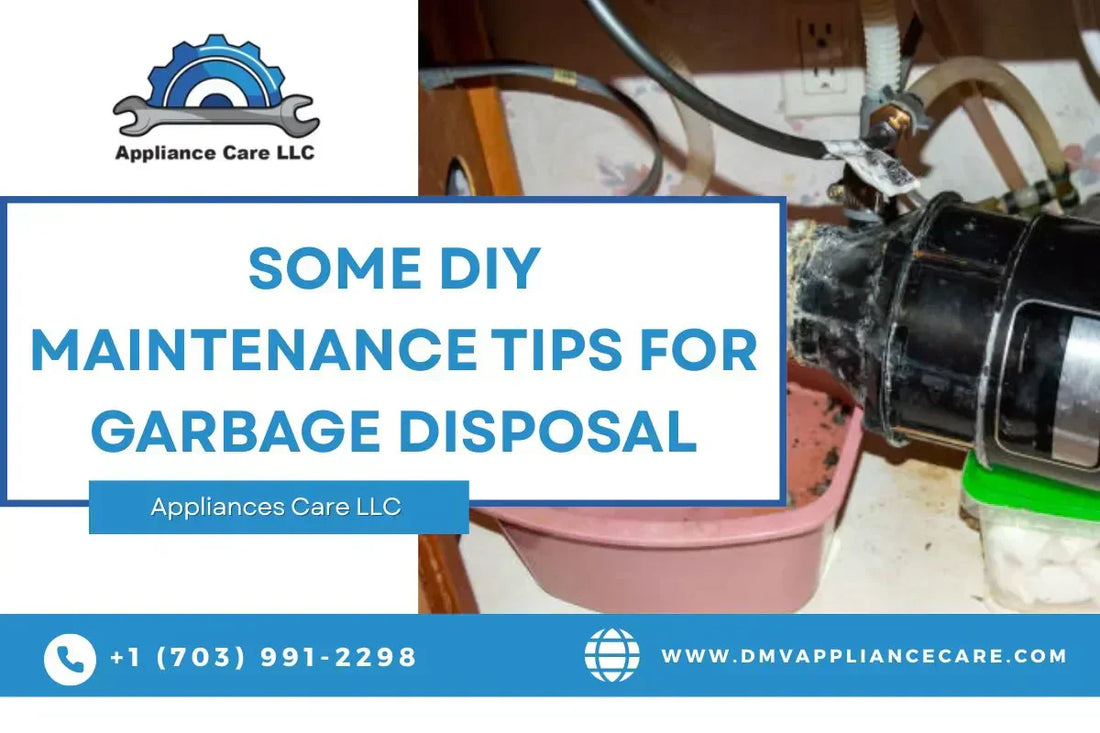Why Regular Maintenance is Important for Appliances?
To keep your home appliances working effectively, safely, and for as long as possible, regular maintenance is necessary. Regular use causes appliances like ovens, dishwashers, washing machines, and refrigerators to deteriorate over time. Without regular examinations, minor problems may go undetected and eventually grow into expensive repairs or total malfunctions. Maintenance extends the life of your appliances, lowers energy use, enhances performance, and helps find and address minor issues early. By stopping electrical leaks or breakdowns that could present major problems, it also guarantees safety.
Some DIY Maintenance Tips for Garbage Disposal:
Here are some DIY garbage disposal maintenance tips that you can use to increase the life of your appliance.
1. Run Cold Water Before and After Us
A simple but efficient maintenance practice is to run cold water both before and after using your garbage disposal. It is easier to put any particles of food into the grinding chamber if you let cold water run for 15 to 30 seconds before turning on the disposal. Following use, the cold water flushes out any leftover particles, avoiding accumulation and blockages in the drainpipe.
2. Avoid Grinding Non-Food Items
Metal, glass, plastic, and even food packaging can seriously harm the motor and internal blades. In the same way, don't pour oil, grease, or other fatty materials down the disposal because they can solidify in the pipes and block them. Foods that are hard, like banana peels, corn husks, onion skins, or celery stalks, can wrap around the blades and cause jams and decreased efficiency.
3. Clean with Ice Cubes and Salt
Using ice cubes and rock salt to clean your garbage disposal is an easy, efficient maintenance tip. Simply add a tablespoon or so of coarse stone salt and a handful of ice cubes to the disposal, turn it on, and run cold water. Food particles and stubborn grease are removed from the grinding chamber and blades by the abrasive action of the salt and ice. In addition to cleaning the disposal, this technique helps to keep the blades slightly sharper over time, increasing their efficiency. To keep your garbage disposal in optimal condition, perform this easy maintenance step once or twice a month.
4. Use Citrus for Freshnes
Want your kitchen to smell clean and inviting? Citrus peels are a natural solution! Simply grind small pieces of lemon, lime, or orange peels in your garbage disposal. Not only do they help eliminate unpleasant odors, but they also leave behind a fresh, zesty scent that makes your sink area feel revitalized.
5. Avoid Overloading the Disposal
To keep your disposal running smoothly, avoid cramming in large amounts of food waste all at once. Instead, feed scraps gradually while running cold water. This prevents jams, reduces strain on the motor, and extends the life of your unit. Remember—slow and steady keeps your disposal healthy!
6. Regularly Clean the Rubber Splash Guard
The rubber splash guard often hides grime and bacteria that cause lingering odors. To keep things hygienic, remove the guard (if detachable) and scrub the underside with a brush and warm, soapy water. Even if it's not removable, lifting the flaps and cleaning underneath regularly helps prevent buildup and keeps your sink area fresh.
7. Use Baking Soda and Vinegar
For a natural deep clean, pour ½ cup of baking soda into the disposal, followed by 1 cup of white vinegar. Let the foaming action work its magic for 5 to 10 minutes. Then, flush the disposal with hot water to rinse away residue and neutralize odors. It's an easy, eco-friendly way to refresh your system!
8. Check for and Remove Blockage
If your garbage disposal stops working or makes a humming noise, it may be jammed. First, unplug the unit to ensure safety. Then, insert a hex wrench into the slot at the bottom of the disposal and gently turn it back and forth to free up the blades. Never use your hands inside the disposal—this could cause serious injury. Once the jam is cleared, plug the unit back in and test it with cold running water.
9. Avoid Hot Water While Grinding
Always use cold water while grinding. Hot water, although effective for cleaning in many situations, can actually cause problems for your disposal system. Here's why:
- Melting Fats and Grease: Hot water can melt fats, oils, and grease from your food waste. Once melted, these substances travel further down the pipes, where they cool and solidify, leading to blockages and potential plumbing issues.
- Efficient Grinding: Cold water helps keep food waste firm, making it easier for the disposal blades to grind efficiently without causing clogs or damage to the system.
10. Run Disposal Regularly
Frequent use of your garbage disposal is key to maintaining its efficiency and longevity. Here’s why running it regularly, even when you don’t have food waste, is a smart practice:
- Prevents Rust and Corrosion: Regular operation keeps all moving parts lubricated and prevents rust from developing on the blades or other components.
- Avoids Food Buildup: Running the disposal ensures that no small pieces of food waste are left sitting in the system, which could otherwise cause odors or clogs over time.
- Maintains Functionality: Even if you don’t have food waste, running the disposal with water keeps the motor and blades in working order, preventing them from seizing up due to lack of use.

DIY Maintenance vs. Professional Repair: When to Service Your Garbage Disposal
Garbage disposals are one of the most used - yet often ignored - kitchen appliances. They help keep your kitchen clean and manage food waste efficiently. However, without regular maintenance, they can get clogged, jammed, or stop working entirely. Knowing when to perform DIY maintenance and when to call a professional is essential for keeping your garbage disposal in top condition.
When to Do DIY Garbage Disposal Maintenance

DIY maintenance is simple and helps prevent common problems like odors, clogs, or motor strain. Here's what you can do:
-
Run Cold Water During and After Use
Cold water helps solidify grease or oils so they can be chopped up and flushed away properly.
-
Clean Weekly with Natural Solutions
Use a mixture of baking soda and vinegar to break down buildup and eliminate bad smells. Ice cubes and rock salt can help clean the blades.
-
Avoid Problem Foods
Never put hard foods like celery, grease, bones, or coffee grounds into the disposal. These can jam or clog your garbage disposal.
-
Check for Loose Connections
Weekly check under the sink for confirmation that there are no leaks or loose fittings around the disposal unit.
Doing these small tasks regularly keeps your garbage disposal fresh, odor-free, and functioning efficiently.

When to Call a Professional
There are certain issues you shouldn’t handle on your own. Call an expert if:
- The disposal is making loud grinding, humming, or rattling noises
- It has completely stopped working, even after pressing the reset button
- There’s water leaking from the disposal or surrounding pipes
- Bad odors won’t go away, even after cleaning
- You notice electrical issues, like flickering lights when using the disposal
Trying to fix these problems without proper tools and experience can make the situation worse or even cause injury. An experienced technician can repair your garbage disposal more expertly than you.
Conclusion
Now your garbage disposal maintenance does not give you any problems. A mix of weekly cleaning and good usage habits can prevent most problems. But when strange noises, leaks, or malfunctions occur, it’s best to call professionals.
Appliance Care offers fast, reliable garbage disposal repair services across Virginia and Maryland. Trust the experts to keep your kitchen running smoothly.
Call: +1 (703) 991-2298
Emails: support@dmvappliancecare.com
Website: https://dmvappliancecare.com

